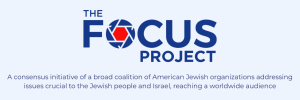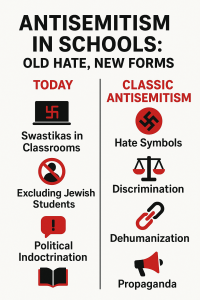
August 19, 2025
STAY INFORMED – TALKING POINTS – ACTIONS TO CONSIDER – STORIES MAKING NEWS
![]()

Many Jewish students and staff – both at K-12 schools and on university campuses – were targets of threats, intimidation and violence since Oct. 7, 2023 – leading to lawsuits, funding and donation cuts and a host of new regulations to protect students and staff. Will this year be different?
Immediately Condemning Attacks: ‘Obligation to keep students safe’
Some universities acted swiftly after the Oct. 7 Hamas massacre, setting expectations early, communicating clearly and following through with consequences for students and staff who targeted and harassed Jews on campus. Many others did not – often allowing protests and encampments to lead the lawlessness.
Dartmouth College stood out by launching its Dartmouth Dialogues program to build “brave spaces” for difficult conversations while drawing a clear line between free expression and intimidation. When encampments broke campus rules, Dartmouth enforced its policies while maintaining a commitment to dialogue. This balance of dialogue and accountability has been held up nationally as a model of leadership.
Notre Dame Law School’s Religious Liberty Initiative hosted an event a few weeks after the Hamas attack that connected Jewish-Catholic history to the rise in anti-Jewish hatred. Most Reverend Robert J. McClory: “The Church decries hatred, persecutions and displays of antisemitism directed against Jews at any time and by anyone.”
The Univ. of Florida demonstrated how a large public institution can set the tone through words and actions. Its president spoke early and unequivocally about protecting Jewish students, while also pledging that hatred would have no place on campus: “Just as we have an obligation to protect speech, we have an obligation to keep our students safe. Throwing fists, storming buildings, vandalizing property, spitting on cops and hijacking a university aren’t speech.” When students crossed the line from protest into policy violations, UF suspended participants and even withheld diplomas from graduates who engaged in misconduct.
Praise for Schools Taking Positive Steps: ‘Meaningful accountability’
Jewish leaders in Massachusetts praised the state’s new K-12 recommendations developed by the Special Commission on Combating Antisemitism. The effort comes amid concerns that a teachers’ union promoted “overtly political” anti-Israel materials and an “extreme, one-sided narrative.” The CEO of Boston’s Jewish Community Relations Council called the new plan “a roadmap for meaningful interventions with clear timelines for follow up and accountability.”
At Westfield Middle School in MA, Principal Jesse McMillan, responded decisively when swastikas appeared on school grounds. He immediately alerted parents and administrators, brought in the local Jewish Federation to provide educational resources and developed a special curriculum to teach his students about antisemitism and sensitivity towards others. McMillan also made clear that displaying hate symbols would carry severe disciplinary consequences, stressing that such acts “create an unsafe learning environment” and undermine the school’s mission.

Schools Choosing Action Under Duress: ‘Jewish students and staff experienced pain’
Other universities have taken steps to protect students only after finding themselves under intense pressure. Columbia Univ. became a flashpoint as encampments spread and antisemitic rhetoric escalated. For weeks, administrators hesitated – until images of Jewish students needing police escorts across campus and Congressional scrutiny forced their hand. Only then did Columbia tighten protest rules and begin to take actions against disruptive students.
The university recently settled with the federal government. The university stated: “ Our leaders have recognized, repeatedly, that Jewish students and faculty have experienced painful, unacceptable incidents and that reform was and is needed.” For many Jewish students, the message was clear: protection came only after reputational risk became too great to ignore.
This reactive pattern also played out elsewhere. Universities that hesitated to enforce their own rules often saw situations spiral until they faced legal consequences. In those moments, administrators scrambled to reassert control – banning masks at protests to aid accountability, pressing criminal charges against vandals or rewriting their student codes of conduct.
Challenges Remain: ‘Jews are baby killers’
Even as some schools take action, shocking incidents continue – especially in local K-12 schools. The Brandeis Center for Human Rights Under Law recently filed a civil rights complaint against the Nysmith School in Virginia, where three Jewish siblings endured persistent bullying. Classmates told one of them, an 11-year-old girl, that Jews are “baby killers” and told her she deserved to die. When her parents pressed the school to act, administrators cancelled a Holocaust education event and ultimately expelled all three Jewish students. The case highlights how institutions sometimes punish victims rather than confront antisemitism head-on.
In Massachusetts, the ADL and Brandeis Center filed a federal complaint detailing “rampant antisemitic abuse” at Concord-Carlisle High School. According to the filing, administrators ignored repeated harassment, graffiti and threats, forcing at least one student to transfer.
University Reforms Still Needed: ‘Jewish students are being forced to hide’
Some universities are now under federal investigation for failing to protect Jewish students. George Washington Univ. was found by the Dept. of Justice to be “deliberately indifferent” to antisemitic harassment during Gaza war protests. The DOJ has threatened enforcement actions unless GWU responds soon. Western Washington Univ. and George Mason Univ. also received federal letters.
The Univ. of California system is the subject of a sweeping civil-rights probe under Title VII, investigating whether it allowed – or even enabled – a hostile environment for Jewish faculty and staff amid escalating demonstrations and campus tensions. UCLA is facing the possible suspension of $584 million in federal research funding because of alleged lapses. This followed a recent $6 million settlement where the university settled with Jewish students and a professor.
The Univ. of California Board of Regents chair commented on the agreement: “We have been clear about where we have fallen short of our values and we are committed to doing better moving forward. Our critically important goal is to foster a safe, secure and inclusive environment for all members of our community and ensure that there is no room for antisemitism anywhere on campus.”
A coalition of leading Jewish groups recently urged universities to pursue reforms. ADL CEO Jonathan Greenblatt: “Universities need to take steps to ensure Jewish students can learn without fear. They are being forced to hide who they are, and that’s unacceptable – we need more administrators to step up.”
![]()

![]()

Every American Can Help
Protecting Jewish students requires action at every level. Parents, alumni, faculty, students and community members can make a difference by insisting that universities and K-12 schools uphold their responsibilities.
A. Actions for parents
B. Actions for Students
C. Connect with organizations that support Jewish students
D. Actions for Everyone
![]()

Hamas announced that it had accepted a new ceasefire and hostage-release proposal from Egyptian and Qatari mediators, offering a 60-day truce and the release of 10 living Israeli hostages in exchange for 150 Palestinian prisoners, followed by talks on a broader deal. Hamas leaders signaled they had dropped many earlier demands, but Israel remains deeply skeptical because in every proposal, Hamas demands to stay in power and refuses to disarm. Previous announcements by Hamas leaders did not lead to a ceasefire deal.
Israel’s recent position was that Israel only would accept a deal that included the release of all 20 remaining living hostages, the return of 30 deceased hostages and the permanent disarmament of Hamas. A report indicates that Israel may accept this latest deal even though it falls short of its demands. The Arab League recently called for Hamas to disarm and no longer rule Gaza – a position strongly opposed by Hamas leaders. More Palestinians are calling for Hamas to leave power – and the terror group is responding with horrific violence.
Stories Impacting American Jews
Stories Impacting the U.S. and Israel
Stories From Around the World
In Memoriam
Stay Informed | Speak Up | Take Action
Want to Read More of Our Talking Points? Did you miss a recent edition of The Focus Project? No need to search your inbox. Our most recently published editions are available on our website.
![]()

This content is developed by The Focus Project in partnership with MERCAZ USA. The Focus Project distributes weekly news and talking points on timely issues concerning Israel and the Jewish people, including antisemitism, anti-Zionism and the delegitimization of Israel. It represents a consensus view across a spectrum of major American Jewish organizations. MERCAZ USA recognizes and respects the diversity of views on these issues among its readers and the community at large.